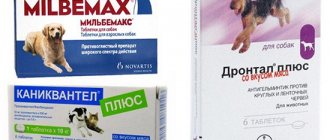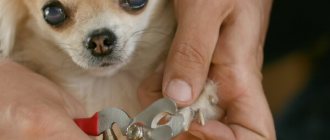Purpose of the procedure
Animals, like people, are susceptible to viral infections.
Preventive measures, one of which is vaccination, help to avoid the disease or reduce its severity. Puppies begin to be vaccinated from the second month of their birth, and then follow a certain schedule. This will allow you in the future, without risking your pet’s health, to take your dog out into the wild or take it hunting with you.
Unvaccinated animals are not allowed to participate in exhibitions and are not allowed to be transported on public transport.
How do worms affect the immune system?
Once in the gastrointestinal tract, worms “travel” throughout the body:
they parasitize muscles and tissues;- penetrate into blood vessels;
- undergo a certain stage of development in the dog’s lungs;
- live in almost all organs.
Helminths harm the entire body, regardless of where they are located (lungs, stomach, intestines).
Worms receive nutrition from animal tissues, poisoning the body with waste from their vital activity. As a result, the dog's immunity weakens. This makes the pet weakly resistant to infections.
Parasites are especially dangerous for puppies: they can lead to intestinal rupture and injury to other organs, causing severe intoxication of the baby’s body.
Helminths and vaccination
A vaccine is a biomaterial containing viruses, upon administration of which the body begins to produce antibodies.
Vaccination prepares the immune system to fight infections. But in order for the body to develop a protective reaction, it needs strength.
Helminths that have settled in a dog deprive it of energy resources. Therefore, the body is not able to cope with two problems at once - the parasites that have settled inside and the viruses introduced by the vaccine.
To prevent a breakthrough in post-vaccination immunity, which leads to a serious illness in the pet, it is necessary to eliminate the harmful factor. This is the main purpose of deworming.
How many days before vaccination to worm?
Even an experienced veterinarian cannot say with 100% certainty at first glance whether a dog has worms. To verify this, you will need tests, which will take some time.
Therefore, if it is time for vaccination, it is recommended to treat your pet in any case..
If there are no infestations, the procedure temporarily protects the dog from their appearance.
In case of infection, high-quality treatment of the animal allows you to destroy most of the parasites, reducing their negative impact to a minimum.
But here it is important to know how many days before vaccination to carry out deworming. If there are worms, they will resist the drugs. This complicates the animal’s condition: vomiting, diarrhea, lack of appetite, and weakness are possible.
In such a situation, the body cannot resist the introduced strains of the virus, which makes vaccination useless.
The immune system needs time to restore its capabilities after the deworming procedure. The doctor must monitor the animal’s condition, so it is recommended to wait 10 days from the moment of worming.
This period is also necessary to determine the degree of infection. Re-processing may be necessary.
In total, deworming products have a prolonged effect of 1-1.5 months. During this period, the dog is vaccinated, not forgetting to wait for a ten-day quarantine.
How to recognize helminthic infestation?
A four-legged friend can become infected with helminthiasis as a result of:
- communication with already sick animals - dogs, cats, birds, frogs, rodents, etc.;
- mosquito bite or ingestion of other insects - fleas, cockroaches, earthworms;
- contact with human things, for example, shoes or clothing, which are carriers of worm eggs;
- drinking from a puddle, pumping in the grass, swimming in open reservoirs while walking;
- eating raw meat (especially pork) and fish.
NOTE! Deworming of puppies before vaccination is also required. As a rule, they become infected in utero or through mother's milk. If you are buying a puppy and cannot be sure of the mother’s health, this procedure is especially important - neglecting it can cost the little creature’s life.
The main symptoms of worm infection in dogs are:
- decreased activity;
- disturbance of intestinal motility (vomiting, diarrhea or constipation);
- dulling of fur;
- decrease or, conversely, increase in appetite with sudden weight loss;
- frequent scratching of the anus;
- live parasite in feces;
- swollen belly (in puppies).
IMPORTANT! In some cases, the disease is asymptomatic. But this does not diminish his danger. To check whether your dog is infected or not, contact your veterinarian.
Principles of deworming
A correctly carried out procedure eliminates repeated worming, even if the puppy is given a second vaccination. But in order to maintain the conditions, certain principles are observed.
What drugs are used
You shouldn’t decide on your own which tablets will help drive away worms. It is better to entrust this to a specialist.
When choosing a product, the veterinarian takes into account:
state of the immune system;- diseases suffered by the pet;
- animal diet;
- age, as well as special moments - pregnancy and lactation in bitches.
When choosing medications, preference is given to complex medications that allow you to rid your dog of all types of parasites..
Dosage of the product
You can choose an anthelmintic drug with a high safety profile and at the same time harm your pet if you make a mistake with the dose and give more than prescribed. A small amount of the product will be useless and will make the procedure ineffective.
Therefore, it is important to correctly calculate the dosage, taking into account the animal’s body weight and age. All necessary recommendations are given in the instructions supplied with the drug. But when it comes to a dog that is old or suffering from a serious chronic illness, you will need to consult a veterinarian.
Time to take anthelmintic
Having calculated the dose for your pet, you should not split it into several doses.
Anti-worm medications are given in one go before morning feeding (or the tablet is crushed and mixed with food).
If the doctor gave different recommendations or the instructions contain different information, then you must follow their instructions.
Time interval for vaccine administration
As mentioned above, the optimal time for vaccination is 10 days after the “attack” on worms.
This is not due to the period of action of the drug on parasites - they die quickly. The body simply needs time to restore the immune-energy balance in order to adequately resist vaccine viruses.
A decade is an optional period. The vaccination can be carried out 2-3 weeks after worming. The main thing is to be in time with the procedure during the period of action of the drug.
In some cases, it becomes necessary to administer the vaccine to the puppy earlier.
This may be due to an upcoming trip, participation in an exhibition, or for another reason. Here it is possible to reduce the recovery period to 5 days when using the immunomodulatory drug Dironet Junior.
Antihelminthic drugs for dogs (names, active substances, method of administration)
If the vaccination is done in a veterinary clinic, then you can remove worms from your pet at home. When using an anthelmintic, you must strictly follow the manufacturer's recommendations regarding how much medication to use for a particular animal and how to give it. Antihelminthic drugs are available in different forms: for oral, external and injection use.
For oral use (tablets, granules, suspensions, pastes)
Tablets and granules for the destruction of parasites are usually used for deworming adult pets, suspension and paste for puppies. To carry out the procedure correctly, you need to carefully study the instructions for use of the drug. Details of some of the most popular oral anthelmintics are presented in the table:
| Release form of the drug | Name | Active substance | Dosage | Mode of application | Minimum age from which the drug can be used | Contraindications | ||
| Are common | Private | |||||||
| Amount of medicine | Pet weight, kg | |||||||
| Pills | Dironet Spot-On | Praziquantel, ivermectin | 0.5 tablets | 1 |
| 2 months | Individual intolerance to the ingredients of the drug, exhaustion, weakened body, infectious diseases. | Pregnancy, lactation. |
| Milbemax for adult dogs | Milbemycin oxime, praziquantel | 1 tablet | 5–25 | 2 weeks | Severe pathologies of the liver and kidneys. | |||
| 2 tablets | 25–30 | |||||||
| 3 tablets | 50–75 | |||||||
| Milbemax for puppies and small dogs | 0.5 tablets | 0,5–1 | ||||||
| 1 tablet | 1–5 | |||||||
| 2 tablets | 5–10 | |||||||
| Gelmimax-4 | Praziquantel, moxidectin | 0.25 tablets | 0,5–1 | The tablets have no age restrictions | Serious disorders of the liver and kidneys, belonging to the collie, sheltie, bobtail breed. | |||
| 0.5 tablets | 1–2 | |||||||
| 1 tablet | 2–4 | |||||||
| 1.5 tablets | 4–6 | |||||||
| 2 tablets | 6–8 | |||||||
| Gelmimax-10 | 1 tablet | 5–10 | ||||||
| 1.5 tablets | 10–15 | |||||||
| 2 tablets | 15–20 | |||||||
| Gelmimax-20 | 1 tablet | 10–20 | ||||||
| 1.5 tablets | 20–30 | |||||||
| 2 tablets | 30–40 | |||||||
| 2.5 tablets | 40–50 | |||||||
| 3 tablets | 50–60 | |||||||
| 3.5 tablets | 60–70 | |||||||
| 4 tablets | 70–80 | |||||||
| Suspension | Prazicide | Pyrantel pamoate, praziquantel, febantel | 1 ml | 3 – for puppies of medium and large breeds, 1 – for puppies of small breeds | In the morning, mix the suspension with a small amount of wet food or place it on the root of the tongue. | 3 weeks | First half of pregnancy. | |
| Dirofen | Pyrantel pamoate, praziquantel | 1 – for puppies, 3 – for adult pets | ||||||
| Drontal Junior | Pyrantel embonate, febantel | 1 | 2 weeks | Not installed. | ||||
| Paste | Dirofen | Pyrantel pamoate, praziquantel | 1 – for puppies, 3 – for mature dogs | 3 weeks | First half of pregnancy. | |||
For external use (drops on the withers)
Antiparasitic drugs in this form of release are convenient because you don’t need to think about how to feed the medicine to your pet. Drops are applied once to dry, undamaged skin. They should be applied where the animal cannot reach. The area between the shoulder blades is best suited for this. When treating a large dog, it is recommended to apply the solution in several places. You should not use anthelmintics yourself to treat pregnant and lactating bitches. It is up to the veterinarian to decide whether to use drops in this category of animals.
Information about some of the most effective anthelmintics in this form of release:
| Drug name | Active substance | Dosage | Contraindications | Minimum age from which the drug can be used, weeks | |||
| Amount of medicine, drops | Pet weight, kg | Are common | Private | Use with caution under the supervision of a veterinarian | |||
| Advocate | Imidacloprid, moxidentine | 0,4 | Up to 4 | Individual intolerance to the ingredients of the solution, violation of the integrity of the skin at the site of application. | Infectious diseases, rehabilitation period after illnesses and surgery. | Pregnancy, lactation period, weight up to 1 kg. | 7 |
| 1 | 4–10 | ||||||
| 2,5 | 10–25 | ||||||
| 4 | 25–40 | ||||||
| Dana Ultra Neo | Fipronil, thiamethoxam, pyriproxyfen | 0,4 | 5 | Infectious pathologies, the recovery period after illnesses and surgery. | 10 | ||
| 0,8 | 5–10 | ||||||
| 1,6 | 10–20 | ||||||
| 3,2 | 20–40 | ||||||
| 4,8 | Over 40 | ||||||
| Stronghold | Selamectin | 0,25 | Up to 2.5 (purple cap) | Not identified | 6 | ||
| 2.6–5 (purple cap) | |||||||
| 0,5 | 5.1–10 (brown cap) | ||||||
| 1 | 10.1–20 (red cap) | ||||||
| 2 | 20.1–40 (green cap) | ||||||
| Combine pipettes of different packaging | Over 40 | ||||||
| Inspector Total S | Fipronil, moxidentine | 0,4 | 1–4 | Infectious diseases, rehabilitation period after illnesses and surgery. | 7 | ||
| 1 | 4–10 | ||||||
| 2,5 | 10–25 | ||||||
| 4 | 25–40 | ||||||
| Helminthal | Praziquantel, moxidentin | 0,4 | Up to 4 | Severe disorders of the kidneys and liver. | |||
| 1 | 4–10 | ||||||
| 2,5 | 10–25 | ||||||
| 4 | 25–40 | ||||||
For injection
Antiparasitic drugs, which require injection, are used when the pet is heavily infested with helminths. You cannot use such means yourself. Improper use and dosage can lead to serious consequences for the health and even life of the animal.
The decision to use such serious veterinary drugs should be made by a veterinarian, taking into account the clinical picture, age and body condition of the four-legged patient.
Nuances worth knowing
The effectiveness of the upcoming vaccination depends on many nuances associated with deworming.
When carrying out the procedure for expelling parasites, take into account the following points:
- If a dog lived on the street for some time and then came into the house, we can say with a high degree of probability that it is infected with worms. Additional doses of the drug may be needed here. But you need to discuss this issue with your veterinarian.
It is preferable to worm a dog from the street using coatings and laxatives. It is important not only to kill numerous parasites, but also to remove them from the body. Otherwise, dead worms can clog the intestinal lumen, causing a lot of additional problems for your pet.- Worm infestations lead to poisoning of the dog's body with toxins. To speed up their elimination, the animal needs to drink a lot. A pet undergoing deworming should always have a bowl filled with clean water.
- The most difficult thing to remove from an animal’s body is trematodes. This is a special type of fluke parasite that firmly attaches itself to tissues. In this case, it is necessary to give the anthelmintic to the pet strictly under the supervision of a specialist, so it is better to temporarily place the dog in a veterinary hospital.
- Deworming may not be effective if your pet has fleas that carry helminths. Therefore, before deworming a dog, external treatment with antiparasitic drugs is carried out 3-5 days before the procedure.
Compliance with all the nuances and principles of worming makes the process as effective as possible and allows you to prepare your pet for the upcoming vaccination.
It is possible to defeat parasites!
Antiparasitic Complex® - Reliable and safe removal of parasites in 21 days!
- The composition includes only natural ingredients;
- Does not cause side effects;
- Absolutely safe;
- Protects the liver, heart, lungs, stomach, skin from parasites;
- Removes waste products of parasites from the body.
- Effectively destroys most types of helminths in 21 days.
There is now a preferential program for free packaging. Read expert opinion.
Read further:
Pyrantel: dosage for dogs in the form of a suspension or tablets, how to use
Anthelmintic herbs for people: a list of the best anthelmintic herbs and their uses
Which is better: Piperazine or Pyrantel - compare two anthelmintics
Pyrantel during pregnancy at various stages, use and reviews
Are vaccinations against toxoplasmosis given to humans, cats and dogs?
Pyrantel for worms (suspension and tablets): instructions for use for children and adults
Is it necessary to undergo the procedure before the second vaccination?
The administration of an antiviral vaccine provides protection against the corresponding infection for a long period. There are certain schemes for grafting strains. Adult dogs are revaccinated annually, and deworming is required before each procedure.
Babies are vaccinated in stages - in 2 doses. If the preliminary removal of worms followed all the rules, one procedure is enough.
The second vaccination is performed after 3-4 weeks, and this fits within the one and a half month interval of action of the drug against worms.
If a puppy was brought from the street and his body is simply “teeming” with parasites, then the first deworming will only partially remove the worms. Therefore, an additional procedure may be necessary before the next vaccination, but this should be decided by the supervising doctor.
If you don’t deworm, what could be the consequences?
Some owners believe that it is irrational to give deworming medications before vaccination if the pet does not come into contact with yard animals.
It is worth remembering that if a dog is constantly indoors without leaving it, this does not protect the animal from infection with helminths.
Parasites can enter the pet’s body through food - raw fish, meat, minced meat, and offal. Fleas carrying microscopic worm eggs enter the house on people's shoes and clothes. These factors alone are the reason for the dog to be periodically wormed.
It is especially important to carry out the procedure of expelling worms before introducing vaccines with virus strains into the body. In this case, background parasitosis will not allow strengthening the immune system, so the protective functions will be unstable or will not be formed at all.
The body, which simultaneously resists infectious viruses and helminths, quickly weakens.
It is difficult for an animal to fight diseases; due to a decrease in immunity, irreversible consequences can occur, including death.











